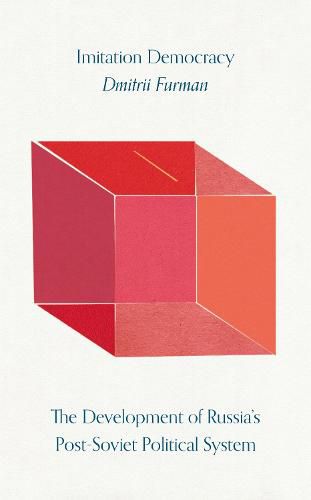Readings Newsletter
Become a Readings Member to make your shopping experience even easier.
Sign in or sign up for free!
You’re not far away from qualifying for FREE standard shipping within Australia
You’ve qualified for FREE standard shipping within Australia
The cart is loading…






After the collapse of the Soviet Union, Russia under Yeltsin and Putin implemented a political system of imitation democracy, marked by a huge disparity between formal constitutional principles and the reality of authoritarian rule. How did this system take shape, how else might it have developed, and what are the prospects for re-envisioning it more democratically in the future?
These questions animate Dmitrii Furman’s Imitation Democracy, a welcome antidote to books that blandly decry Putin as an omnipotent dictator, without considering his platforms, constituencies, and sources of power. With extensive public opinion polling drawn from throughout the late- and post-Soviet period, and a thorough knowledge of both official and unofficial histories, Furman offers a definitive account of the formation of the modern Russian political system, casting it into powerful relief through comparisons with other post-Soviet states.
Peopled with grey technocrats, warring oligarchs, patriots, and provocateurs, Furman’s narrative details the struggles among partisan factions, and the waves of public sentiment, that shaped modern Russia’s political landscape, culminating in Putin’s third presidential term, which resolves the contradiction between the form and content of imitation democracy, the formal dependence of power on elections and the actual dependence of elections on power.
$9.00 standard shipping within Australia
FREE standard shipping within Australia for orders over $100.00
Express & International shipping calculated at checkout
After the collapse of the Soviet Union, Russia under Yeltsin and Putin implemented a political system of imitation democracy, marked by a huge disparity between formal constitutional principles and the reality of authoritarian rule. How did this system take shape, how else might it have developed, and what are the prospects for re-envisioning it more democratically in the future?
These questions animate Dmitrii Furman’s Imitation Democracy, a welcome antidote to books that blandly decry Putin as an omnipotent dictator, without considering his platforms, constituencies, and sources of power. With extensive public opinion polling drawn from throughout the late- and post-Soviet period, and a thorough knowledge of both official and unofficial histories, Furman offers a definitive account of the formation of the modern Russian political system, casting it into powerful relief through comparisons with other post-Soviet states.
Peopled with grey technocrats, warring oligarchs, patriots, and provocateurs, Furman’s narrative details the struggles among partisan factions, and the waves of public sentiment, that shaped modern Russia’s political landscape, culminating in Putin’s third presidential term, which resolves the contradiction between the form and content of imitation democracy, the formal dependence of power on elections and the actual dependence of elections on power.